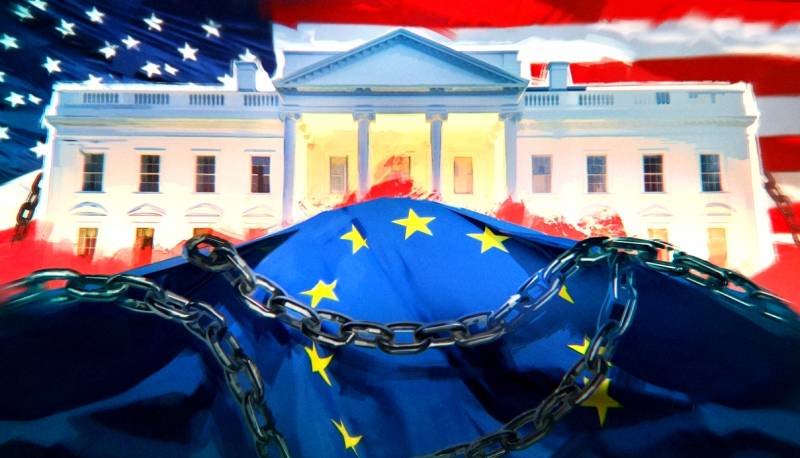Losing billions: rebellion ripens in EU due to sanctions against Russia
Economic the crisis, the confrontation with the Kremlin and the need for anti-Russian sanctions imposed by Washington have revealed a whole range of European Union problems. In Europe, the voices of Euro-skeptics are heard more and more, making their claims to Brussels officials and their internal and external policy.
On the issue of imposing sanctions against the Russian Federation in the Old World, different opinions sound. Belgian political scientist Chris Roman has a negative attitude to this decision of Brussels:
The negative image of Russia created by the European media destroys the career of those who consider it possible to speak about Russia in a positive way in a "liberal" Europe. Other Europeans who have worked, for example, with the Russian Crimea, have problems with local authorities insisting on the closure of such a tourism business.
Extremely negative emotions are caused by residents of successful members of the European Union, the fact that a high standard of living in less successful members of this interstate entity is paid from their budget. The Dutchman Albert Calle describes the internal policy of the European Union as follows:
Due to the actions of Brussels, Calle was forced to sell his house, which was no longer able to pay. The citizen of Sweden Carl Constant de Flon echoes him:
What does not suit many residents of the Old World is how European officials intervene in the internal politics of the participating countries. For example, according to EU rules on maintaining a low budget deficit, EU members must adhere to the principle of budget savings. Because of this, the authorities are forced to cut social programs and rates in the public service. Europeans associate the policy of Brussels with the understaffing of the police, polyclinics and educational institutions.
The authorities of the European Union impose common standards on the member states, for example, in the automotive industry or electricity meters. As a result, Europeans are forced to get rid of old diesel cars that do not meet the new technical regulations, and buy new ones.
Many French are suspicious of neighboring Germany, rightly believing that the introduction of a single European currency was beneficial primarily to this power. Xavier Zhego, one of the French Euro-skeptics, evaluates the situation with the euro:
What's so draws the line under his vision of a single union of 27 states: the European people, the European nation are absent.
On the issue of imposing sanctions against the Russian Federation in the Old World, different opinions sound. Belgian political scientist Chris Roman has a negative attitude to this decision of Brussels:
The decision on sanctions costs us billions, several thousand people lost their jobs
The negative image of Russia created by the European media destroys the career of those who consider it possible to speak about Russia in a positive way in a "liberal" Europe. Other Europeans who have worked, for example, with the Russian Crimea, have problems with local authorities insisting on the closure of such a tourism business.
Extremely negative emotions are caused by residents of successful members of the European Union, the fact that a high standard of living in less successful members of this interstate entity is paid from their budget. The Dutchman Albert Calle describes the internal policy of the European Union as follows:
I believe that we are getting poorer because of the EU. We have to work longer so that in countries of the European Union such as Greece, they continue to pay pensions. Recall the banking crisis in Spain. It was we who paid for it, because the Netherlands is one of the countries that constantly acts as an EU donor
Due to the actions of Brussels, Calle was forced to sell his house, which was no longer able to pay. The citizen of Sweden Carl Constant de Flon echoes him:
The EU makes countries that do not pull richer, and successful states poorer
What does not suit many residents of the Old World is how European officials intervene in the internal politics of the participating countries. For example, according to EU rules on maintaining a low budget deficit, EU members must adhere to the principle of budget savings. Because of this, the authorities are forced to cut social programs and rates in the public service. Europeans associate the policy of Brussels with the understaffing of the police, polyclinics and educational institutions.
The authorities of the European Union impose common standards on the member states, for example, in the automotive industry or electricity meters. As a result, Europeans are forced to get rid of old diesel cars that do not meet the new technical regulations, and buy new ones.
Many French are suspicious of neighboring Germany, rightly believing that the introduction of a single European currency was beneficial primarily to this power. Xavier Zhego, one of the French Euro-skeptics, evaluates the situation with the euro:
The euro currency was designed so that it suited the needs of the German economy. If you look from the point of view of Germany, the euro is underestimated by 20%, which fundamentally stimulates the export of German goods. As for France, the situation is different: the euro is revalued by 15%. Because of which unemployment is growing, and it becomes more difficult to sell our goods in foreign markets
What's so draws the line under his vision of a single union of 27 states: the European people, the European nation are absent.

Information